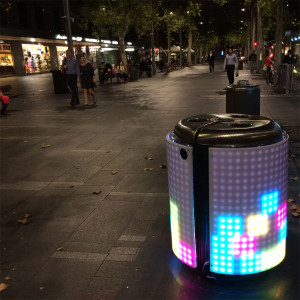
View Case Study
The disposal of rubbish is meaningfully turned into a game, TetraBIN is designed to inspire people of all ages to become eco-aware.
Steven Bai developed the initial idea for the TetraBIN project, which was then implemented with his friend and colleague Sam Johnson and his lecturer Martin Tomitsch. Our goal for this project was to explore the idea of play as a way of inspiring people (especially the younger generation) to be aware of environmental issues, such as the collection and management of waste in cities.
TetraBIN re-imagines traditional city bins through game thinking with the aim to tackle the problem of littering by making the disposal of rubbish fun and rewarding. Reminiscent of 8-bit era video games, it maps the disposal of rubbish to interactions within a game world displayed on a computer-controlled LED screen wrapped around the bin. Custom-made sensors inside the bin are triggered every time a piece of rubbish is dropped into the bin. As the rubbish is submerged into the bin a digital building block is released from the top edge of the LED screen. This augmentation transforms the otherwise trivial act of disposing of rubbish as the participant must drop their rubbish at the right moment to advance further in the game. Once an entire row is filled with building blocks it disappears, making room for more blocks.
A first fully working design was exhibited during Vivid Sydney in May/June 2014 (18 days) - a festival of light and idea attended by 1.4 million people. A second design was deployed on the main avenue of the University of Sydney campus in October/November 2014 (30 days).
The game mechanics are intentionally loose to allow participants making up their own game rules. For instance, participants can collaborate to create a vertical stack, which restarts the game, or compete by each creating their own vertical stacks. Beyond reducing litter, TetraBIN invites passers-by into brief social interactions and to consider environmental issues in the city.
- Why this project is worthy of a UX Award:
Depositing of rubbish into a bin, which is normally seen as a passive experience requiring minimum thought is given importance as the participant must drop their rubbish into the bin at the right moment to advance further in the game. This experience of an augmented reality in which actions in the real world affect the virtual world lead the participant to consider environmental issues facing the city, specifically the collection and management of waste. And it's not just that you are getting rewarded because you did something good for the society, but also the bin creates an entirely new dimension of how urban experience could be indirectly and positively enhanced.
We observed that some people came to interact with the installation because they were encouraged by the selfies their friends had posted on social media. Similarly, the opportunity to share their interaction on social media seemed to encourage some people to interact. One participant stated “I am going to form a letter ‘Z’ and take a selfie with the bin!”, while interacting with TetraBIN and attempting to create a special pattern on the bin by using the playful game element generated by the installation. In this case, TetraBIN became an intersection between social media and collaborative urban experiences.
Other people were claiming ownership of certain elements of the playful element generated by the installation, such as claiming over the ‘block’ that people released by putting a piece of garbage into the bin. The use of colours and the design of the neutral ‘teaser’ block, which was randomly assigned a colour when released, seemed to amplify this effect. For example, a person shouted out “The green block is mine, hope I can get another green one next to it!” after putting her piece of rubbish into the bin. TetraBIN created digital traces of personal interactions within public space, and this has led to a sense of ownership. All these experiences were playfully meaningful and familiarly immersive.
- Submitted By: TetraBIN team
See More 2015 Submissions >>